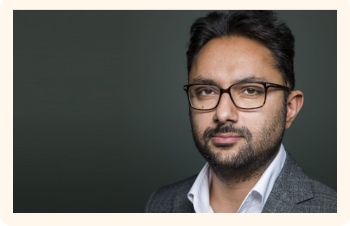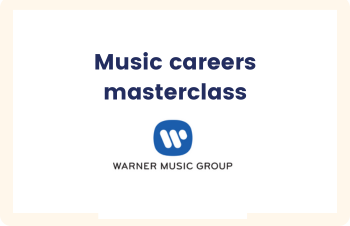In our latest masterclass we headed down to WME’s offices for a masterclass from three of our talented alumni and former recipients of our Career Development Bursary plus a member of WME’s brand partnerships team…
Alice Kemp-Habib, Features Editor at The World of Interiors
Yolanda Lee, Story Consultant & Development Producer
Ama Ofori-Darko, Head of Development at Park Theatre
Zayanne Bako, Brand Partnerships Assistant at WME and creative careers content creator
These creative powerhouses provided insights into their career journeys across theatre, journalism and media, sharing how they use storytelling to shape narratives across platforms and gave advice on everything from handling rejection to freelancing.

Storytelling is the uniting thread throughout all our panellist’s roles…
For Zayanne running a creative careers TikTok is intrinsically linked to her full-time gig at WME where she connects influencers with brand opportunties working with the likes of Candice Brathwaite and Uma from Love Island. The two roles lend nicely to each other: both require her to work alongside creatives during the messy and unpredictable journey to creating a finished product. She says, “Brand partnerships is all about building authentic relationships through creators and brands; you’re not just facilitating deals you’re watching them create something that lasts.”
Development producer Yolanda says that although the ‘thing’ that makes good TV and film is a bit ineffable, she is always looking for a voice, someone with something to say and a unique take on the world. She says it’s vital to stay true to your own perspective in storytelling, “it’s not quantifiable but it’s obvious if someone is doing something just to make money or following trends.”
Ama originally trained to be an opera singer and after graduating found herself working at the Royal Opera House as an usher. This exposed her to the concept of arts fundraising and development. Theatre is her biggest passion and she had a full circle moment when she went back to work as a fundraising manager at Royal Opera House in 2023. Now Ama freelances with artists and helps weave their stories into fundraising applications.
Meanwhile, Alice is a former freelance journalist turned luxury magazine editor. Previously she was the one being commissioned, now she’s the one doing the commissioning. She says being a magazine editor means you have to develop a visual literacy because the copy and the imagery has so much synergy; you don’t have that say as a freelancer on the full visual story, but on a magazine team you do.
Do I have to go freelance to have a creative career?
As a recent freelancer, Yolanda is honest explaining that whilst it’s not the best time to be a freelancer in TV, she says, “you have to be brave and take calculated risks – I also work for Film Wales, so I wasn’t stepping in without a safety net”. She continues that 8 years into her career, she’s spent time building relationships and checking in on people and now has people approaching me about opportunities rather than the other way round.
Similarly, Ama says she has made a lot of connections throughout her career so far. She encouraged our audience to reach out to people and not feel embarrassed – people love to talk about what they do! “I’ve spent a lot of time networking and reaching out to people to tell them I enjoy their work and would be up for working with them”. Echoing Yolanda, she said: “It’s really tough right now so I would recommend doing something like having a part-time perm job alongside your freelance gigs.”
Alice says she was able to live at her family home whilst freelancing and says that whatever you decide – whether you go freelance or stay in permanent work – it’s a deeply personal decision. You have to weigh up your finances, your networks and assess what you need from your career to decide. Depending on your situation, it might not always make sense to go freelance.
Echoing this, Yolanda emphasised that you can do a job that’s completely unrelated to your creative passion! It doesn’t take away from your creative pursuits.
On her TikTok channel, Zayanne helps creative discover new creatives. “It’s not for me, so I was confused when I started to get traction from brands; I never viewed how much value the content until people said I found my role through your page and then that made me realise it could be important to monetise it.” She said that whilst monetising your creative side hustle is great, it’s helpful for her to have her permanent role at WME. It means that the money isn’t the ‘main focus’ and she can only promote brands and opportunities that align with her and her audience.
On pushing your career forward…
All of our panellists agreed that they were putting in the work for a while before things finally aligned.
Although Zayanne is all about providing others with the hottest opportunities on TikTok, she says, “it’s important to create your own opportunities too – it’s hard to find roles. If you have the capacity to create something, then do it”. She explained that she wouldn’t have got her current role at WME if it wasn’t for showcasing her brand partnership skills on her TikTok channel: “You don’t know the value of the work you have sometimes until you go for an opportunity and get it because you’re already doing the work!”
Yolanda recommends: “Do whatever you can to be an expert in your field until the right door opens… it might not always be the door that you’re expecting”. She told our audience to have everything ready to go for when it, for example, your portfolio and CV for when that moment comes.
Ama is also an advocate for researching –: “if you know what end goal you want, research! Get books on the topic, speak to people in those roles, send emails to people you admire and want to work with, find out what experience you need to get to get there.” She says, she is always looking at the next step once she’s settled into a role.
For Alice, mentorship has been essential at every point of her career: “Every significant experience I’ve had has come through a mentor recommending me for an opportunity”. (Find out about our mentoring schemes!)
How to handle rejection
Unfortunately, getting a no is going to happen at some point in your creative career. So how can you handle these knockbacks?
Yolanda gave frank advice to the audience: “Realise that your value doesn’t come from your career”. It’s important not to take it to heart, she says. Rejection can also just be redirection, sometimes you have to take the scenic route! “It’s only when you look back that you realise you were being led down a path that was necessary, that gig might not have been good for you and maybe you dodged a bullet.”
Ama stressed the importance of have a strong network who you can vent to. Zayanne backed this up by saying having a network or mentor can help put language to what sort of jobs/industries you should be applying for. She echoed Yolanda’s point that “you’re more than what you do” and encouraged people to find a way to get feedback so you can use that for your next application.
Top tips for applying for funding
First things first, we asked Ama (who writes funding applications for her *literal job*) on her top tips for creatives applying for funding…
- A lot of the time you really need to align with what the funder wants to fund – make sure you specifically state this
- Get multiple people to read the applications – does what the funding would mean to you come across?
- Stick to word counts!
Our former recipients had some words of wisdom when it came to our Career Development Bursary in particular…
- Yolanda was travelling a lot for work and living out of suitcases, so she applied for a high-quality suitcase! Her top tip was to give evidence in your application give evidence – ‘you don’t have to apply for the full amount and I had very specific links and evidence on the durability’.
- Alice was still freelancing at the time and was struggling to progress or get a pay rise. She used the funding for a training course; “it equipped me with tangible editing skills and training looks like you’re taking yourself seriously on your cv”. She also says this is the reason she got her current job.
- Ama had taken a pay cut during COVID and was living at home. She used the funding to support paying for a deposit to help her move out. Her advice? “Be very clear about why you’re applying, how it aligns with career goals, and get someone else to look over it to see it makes sense”
We learnt so much from these absolute creative industry superstars! Don’t miss out on our next event and register with our opportunities board here.




